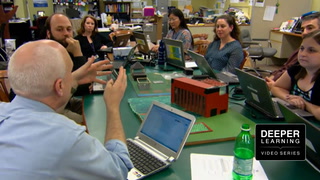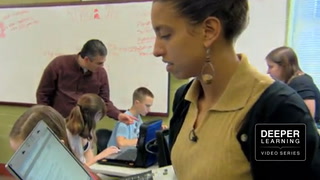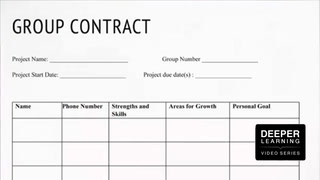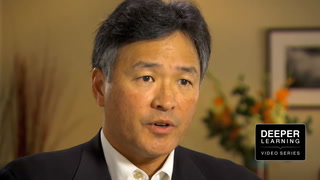Group Contracts for Collaborative Work Transcript
Teacher: Where do you guys stand so far? Has anyone posted and completed it? Nice job.
Narrator: Contract is a very important tool because we find that if you don’t have any norms to come back to, there’s no ground to stand on where you’re trying to adjust the problem, other than people’s personal perspectives.
Teacher: I don’t feel like we could implement that.
Narrator: We start at the beginning of the year with students creating classroom-wide norms, and then every time they get a new team, they create team norms. That’s right down the detail that if someone’s absent, what can you expect from them, as far as communication? Do you expect them to respond to emails? In what time period? Whatever it is, there needs to be a means of communication. They also, in their contract, determine how they’re gonna make decisions, whether by consensus or majority vote or some other system. They need to agree on all of these parameters.
Student: I’ll make the Google iFolder.
Student: Using the contract is something that is really hard to do in the beginning, and holding people accountable is very hard to do when you first come to Tech Valley. It’s something that you’re not used to doing. You don’t have to at a traditional school. It’s all about me and my grade needs to be good. As soon as you get here, the first thing you do is you get thrown into a group, and all of a sudden, you have to worry about yourself and two to three other people. As problems arise and you adjust them through the contract, usually it’s on a warning system, so you don’t do your work one day, you get a warning.
Narrator: After three warnings, they’re actually fired from the team. They have to complete the project on their own. Students are motivated not to get fired because it’s very daunting to do a four-person project by yourself.
Teacher: Are you guys all set with your deadlines?
Narrator: We do support them in asking the question. When they’re issuing a warning, well, why did that happen? What could the team do to support that person in the future so that breakdown of communication or accountability doesn’t repeat itself.
Teacher: Excellent. You’re on track.
[End of Audio]














19 Comments
Denise Callwood... Feb 28, 2021 12:55pm
Often times students complain about not wanting to work on group projects even though they know the value of collaboration as teachers. The contract concept would be helpful for even college students and my graduate classess.
When the collective group agrees on the expectations and concequences, the individual is now accountable not just to the group but to themselves as well.
Elena Clemons May 7, 2020 9:49pm
1. Some of the problems students may encounter when working in groups or on extended, complex projects is that one or more students may not complete their tasks and depend on others to do the work for them. Another problem might be the difficulty in managing a more complex task and students making sure that everyone in their group is staying on tope of their work.
2. To mitigate these challenges, contracts may include the breakdown of responsibilities for each student in the group. Consequences for not following through on responsibilities would also help to make sure everyone is on task.
3. For contract to be effective, the teacher is responsible for oversight. Students should also have clear expectations that are practiced from the beginning.
Ann Martin May 5, 2020 8:34pm
1,Some of the problems students may encounter when working in groups on extended or complex projects include one or more students taking over other students' tasks and students taking advantage of the dominating student by allowing them to do most of the work.
2. Contracts allow for fair up-front expectations of everyone's role. Students are able to hold each other accountable. Having a consequence section set up may motivate students to work together rather than handing daunting tasks alone.
3.Student accountablity, group responsiblility, clear expectations, and teacher being hand on are some of the checks and balances that needs to be in place.
April Gunter Jan 21, 2020 4:49pm
These are great online class contracts. The contract provides a series of checks and balnces as well as consequences for student uwilling to carry their weight within the group.
April Gunter Jan 21, 2020 4:47pm
These are great online class contracts. The contract provides a series of checks and balnces as well as consequences for student uwilling to carry their weight within the group.